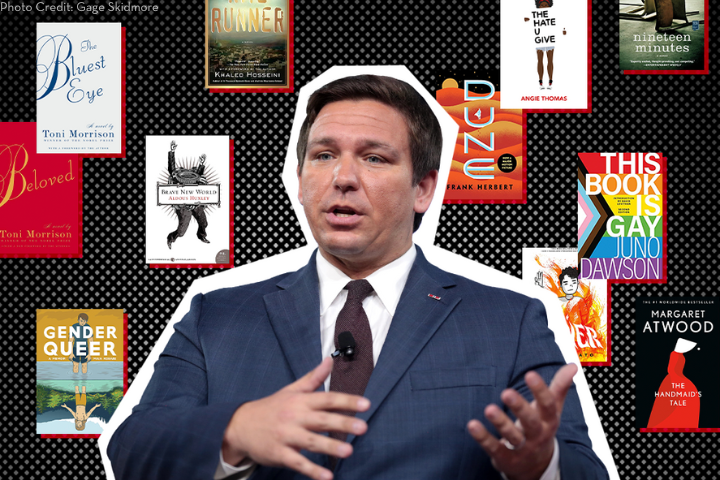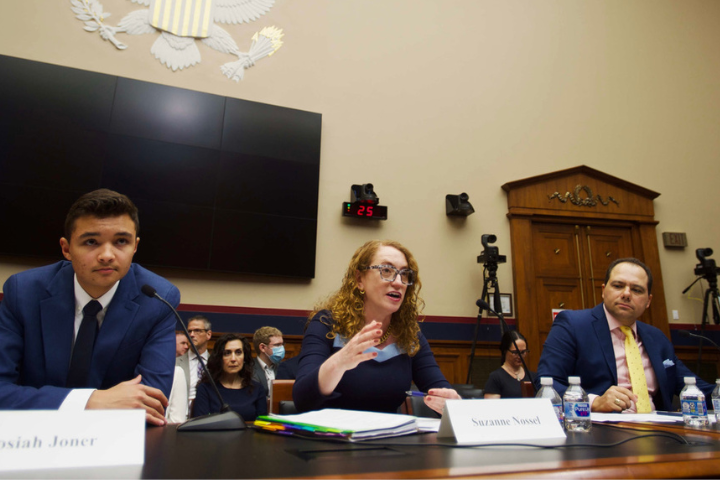
In his debate with California Gov. Gavin Newsom, Florida Gov. Ron DeSantis claimed that book bans in his state were a “false narrative.” PEN America counted 1,406 book bans in Florida in the last school year. But don’t take our word for it that Florida bans books – take DeSantis’.
This year, DeSantis’ education department asked Florida schools to gather the list of books they banned, and then published it. Florida’s own list, published in September, counts 300 removals in 20 of the school’s 67 districts in the 2022-2023 school year. Some of those books were banned in multiple districts. Overall, the state said school districts received 1,218 objections about books.
While Florida admits that it is banning books, the state’s list underrepresents the actual number of bans. The list relies on districts self-reporting bans, annually, following parent or community member complaints. PEN America’s count is more comprehensive, based on news reports, public records requests, and district websites and directives between July 2022 and June 2023.
However you count it, there’s no question Florida book bans are not a hoax – which DeSantis himself admits when he grandstands about removing books with “CRT” and “pornography” from schools.
FALSE CLAIM: TONI MORRISON ISN’T BANNED IN FLORIDA
THE TRUTH: MORRISON’S BOOKS WERE BANNED 21 TIMES IN FLORIDA IN THE 2022-2023 SCHOOL YEAR
DeSantis claimed Nobel Prize-winning author Toni Morrison was not banned in Florida. But books by Morrison appear four times on Florida’s own list.
PEN America counted 21 instances of Morrison’s books being banned in Florida school districts in the 2022-2023 school year. Publicly documented removals of books by Toni Morrison in Florida include those in Clay County, Hamilton County, Martin County, Okaloosa County, and Pinellas County. Bans of Morrison were also documented in the 2021-2022 school year such as in Jackson County, Lee County, and Sarasota County, as recorded by the Florida Freedom to Read Project.
FALSE CLAIM: THE BOOKS REMOVED ARE PORNOGRAPHIC
THE TRUTH: NONE OF THE BANNED BOOKS ARE PORNOGRAPHY
None of the books cited by DeSantis in the debate fit the well-established legal and colloquial definitions of “pornography” or “indecency.” But it’s no coincidence that many reflect LGBTQ+ identities. 36% of the book bans counted in the 2021-2022 and 2022-2023 school years included LGBTQ+ representations.
Books that reflect LGBTQ+ identities save lives and offer important mirrors for young people to see themselves in literature. Take Flamer, by Mike Curato, one of the books frequently targeted for banning in Florida and named in the debate on Thursday night. Curato explained to PEN America that the book is “about telling someone that regardless of how someone may disagree with who you are as a person, you still deserve to be here. There is a place for you, and no one has the right to take that away,”
Making a book available to students in a school library or classroom library for voluntary reading is not the same as teaching the book in curriculum. Librarians and educators choose books for their literary and educational value, and to reflect the diversity of their students and the world.
FALSE CLAIM: BOOK BANS ARE ‘LOCAL’
THE TRUTH: BOOK BANS RESULT FROM DESANTIS’ LAWS, COUPLED WITH PRESSURE FROM DESANTIS-FRIENDLY ADVOCACY GROUPS
When Sean Hannity, the debate moderator, asked DeSantis whether the bans were state or local, DeSantis said they were “local.” This is misleading. Book removals do happen on a district-by-district basis, but educators and media specialists in the state have been ordered to review and remove books to comply with new state laws, including “Don’t Say Gay,” its expansion bill HB 1069, and “Stop
W.O.K.E.” District administrators cite these laws as explanations for their book removals.
Further, PEN America’s research also shows the presence of advocacy groups, like Moms for Liberty – an organization closely aligned with the Florida governor – can have outsized influence on book bans. Moms for Liberty members have challenged books across the state, like in Santa Rosa, often pressuring school boards or using their school board positions to vote for book bans.
Saying that a book ban is not enacted statewide does not make it less of a ban to the children in those schools who can no longer access the book.
FALSE CLAIM: PEN AMERICA’S COUNT IS OVERSTATED
THE TRUTH: PEN AMERICA’S COUNT IS CONSERVATIVE
Occasionally, critics like DeSantis claim that PEN America is overstating its count of book bans. The truth is, PEN America’s Index of Banned Books is a vast undercount of the true state of book removals. It does not include the wholesale closure of some classroom and school libraries, nor does it count “soft bans” such as restrictions on allowing children to read above their grade level or teacher-level decisions to exclude certain books to avoid conflict. Nor does PEN America count challenges to books that do not result in bans.
PEN America relies on information primarily sourced from local journalists, school district websites, and school board minutes, as well as organizational partners. And, on occasion, governors and their education departments.
As we reported in our Banned in the USA report this spring, “in the 2022-2023 school year, numerous states enacted ‘wholesale bans’ in which entire classrooms and school libraries were suspended, closed, or emptied of books, either permanently or temporarily. This is largely because teachers and librarians in several states have been directed to catalog entire collections for public scrutiny within short timeframes, under threat of punishment from new, vague laws. These ‘wholesale bans’ have involved the culling of books that were previously available to students, in ways that are impossible to track or quantify.”
PEN America defines a book ban as “as any action taken against a book based on its content and as a result of parent or community challenges, administrative decisions, or in response to direct or threatened action by lawmakers or other governmental officials, that leads to a previously accessible book being either completely removed from availability to students, or where access to a book is restricted or diminished.”
Florida’s own definition in their report includes “materials that were removed or discontinued by one of Florida’s school boards in response to an objection raised by a parent of a public school student in the school district or a resident of the county where the school district is located.” Florida’s definition conveniently leaves out books that are removed in an attempt to comply with state law.
Either definition, the results are the same: Books are banned in Florida.
THE VERDICT
DeSantis hasn’t just counted hundreds of book bans in his state – he’s campaigned on it, repeatedly. He has held events featuring oversized props including a poster of the book Call Me Max, about a transgender child, and waved pages of Gender Queer during press conferences. His administration has targeted classroom discussion about LGBTQ+ identities with “Don’t Say Gay,” instigated the “war on woke” in classrooms with his “Stop W.O.K.E.” Act, and targeted teaching of AP African American studies and psychology.
If DeSantis wants people to stop calling him a book banner, he should stop banning books.


